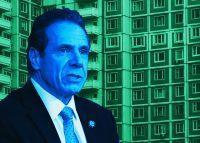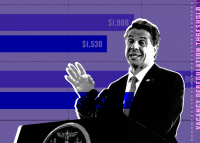Gov. Andrew Cuomo announced this week that he had extended the state’s eviction moratorium through August — but downplayed how much the measure would change after June 20.
The governor said Thursday that the eviction moratorium would last another two months, but would only apply to tenants unable to pay rent due to Covid-19, or who qualify for unemployment. That’s a significant departure from the earlier ban, which didn’t limit which residential and commercial tenants were protected. The change also potentially opens the door for landlords to move forward with certain eviction actions.
Nativ Winiarsky, partner at Kucker Marino Winiarsky & Bittens, said the latest executive order “does not preclude the initiation of a holdover proceeding,” but does contain some caveats. Landlords should consider whether the measure applies to conditional limitation holdovers – cases where non-payment triggered lease termination or there otherwise isn’t a lease in place – if the tenant doesn’t pay rent. And until housing court reopens, he added, the order is “irrelevant,” since landlords cannot commence new evictions.
In the coming days, business leaders plan to request clarification from Cuomo to address the “cloud of uncertainty” surrounding the executive order, Winiarsky said.
The governor’s March 20 executive order bars any enforcement of residential or commercial evictions, while the governor’s latest action limits the ban to renters who are “eligible for unemployment insurance or benefits under state or federal law or otherwise facing financial hardship due to the COVID-19 pandemic.” The order doesn’t specify the parameters for qualifying for “financial hardship.”
A spokesperson for the state’s division of Homes and Community Renewal acknowledged that the governor’s latest order changes the terms of the eviction moratorium after June 20.
“The extension of the moratorium from June until August 20th targets anyone experiencing a financial hardship related to COVID 19,” HCR’s Brian Butry said in an email. He dismissed the idea that the order provides less protection for tenants.
“The language does not weaken the moratorium,” he said.
Read more of our coverage on housing policy amid the global health crisis




But tenant attorneys say the new language pokes holes in the protections of the previous order — especially for those with immigration status. Approximately 504,000 New Yorkers have undocumented immigration status, according to a 2019 report, and about one million New York households are home to at least one person with undocumented status.
“Landlords will bring tenants to court, who will then have to demonstrate to landlords in court that they were impacted, and the court will either find [tenants] credible or not,” said Ellen Davidson, a staff attorney at Legal Aid Society. “In a city where landlords have called [Immigration and Customs Enforcement] on their tenants, people will have to choose whether or not to tell their landlords about their immigration status.”
